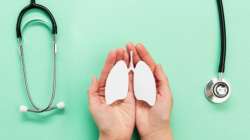Lung Cancer Awareness Month: Types, symptoms, prevention & cure; know when should one screen
According to studies, Lung cancer is the leading cause of cancer-related deaths worldwide. Every year, more than 2 million people around the world are diagnosed with the disease. However, the misconceptions around the illness, regardless of its high occurrence, still prevail. Here's all you need to know about lung cancer:

Doctors and experts are of the opinion that early detection of cancer makes the treatment far easier and survival rates much higher. To raise awareness about lung cancer, its prevention and timely treatment, the month of November is dedicated to Lung Cancer Awareness. According to studies, Lung cancer is the leading cause of cancer-related deaths worldwide. Every year, more than 2 million people around the world are diagnosed with the disease. Environmental risk factors, such as exposure to radon, air pollution, and asbestos, or having had previous lung diseases, in addition to smoking tobacco can be counted as the causes of the majority of these cancers.
However, the misconceptions around the illness, regardless of its high occurrence, still prevail. Here's all you need to know about lung cancer:
What are the types of Lung Cancer?
Dr. Vishwanath S, Consultant Medical Oncologist, Apollo Hospitals, Bangalore, explains, "The most standard types of cancers in the lung are non-small cell cancers (NSCLC) AND comprise adenocarcinomas and squamous cell carcinomas, among others. Small cell carcinomas tend to be aggressive and progress rapidly, representing roughly 10-20 percent of all lung cancers. There is a possibility for cancers from other parts of the body to spread to the lungs; these are called metastases.
What are the symptoms of Lung Cancer?
It is difficult to detect the disease in its early stages since the symptoms can be close to those of a respiratory infection, or there may be no indications at all. Dr. Lancelot Pinto, Consultant Pulmonologist, P.D Hinduja Hospital & MRC, mentions the symptoms that can be related to less severe and acute illness of the disease:
- Unexplained weight loss without a change in diet and exercise plan
- Prolonged cough that lasts for more than two weeks
- Shortness of breath should not be avoided as a symptom of aging
- Chest pain while breathing, coughing, and sneezing
- Swellings in the armpits, neck, or chest area
- Prolonged fatigue, night sweats, and fever
When should one screen?
Dr. Sajjan Rajpurohit, Principal Consultant- Medical Oncology & Centre Head, Max multi-specialty center elaborates, "One should normally screen after the age of 50, but if you have smoked tobacco in the past, screening with a low-dose CT (LDCT) might be something you should discuss with your doctor. Detection of non-cancerous abnormalities are common and could lead to anxiety and invasive tests, so you would want to be mentally prepared and counseled before undergoing such screening".
Does air pollution cause lung cancer?
"It is difficult to prove the link between air pollution and lung cancer scientifically, but there are indicators that it may have a contributory role. Cigarette smoking is, by far, the leading cause of lung cancer. Also, environmental tobacco exposure (ETS, or secondhand smoke), work exposures to certain chemicals, air pollution, and a genetic predisposition could all contribute," adds Dr. Lancelot Pinto, Consultant Pulmonologist, P.D Hinduja Hospital & MRC.
How to prevent and cure lung cancer?
With a few useful lifestyle tips that will also help reduce the risk, lung cancer is preventable. It is safer to avoid smoking and not indulge in passive smoking as well, with smoking being the leading risk factor. And if you do not smoke, it is also unhealthy to stand around individuals who are smoking. The treatment choice depends primarily on the form and stage of lung cancer. Lung cancer individuals can opt to undergo surgery, chemotherapy, radiation therapy, targeted therapy, or a combination of treatments. People should consultant their oncologist, who would help more with a detailed prognosis, taking into account the general health of the person and the nature of their cancer.